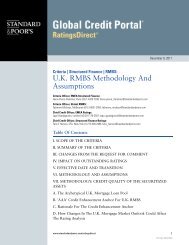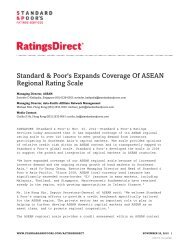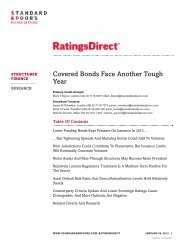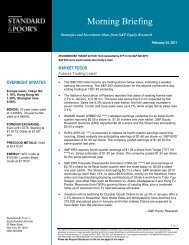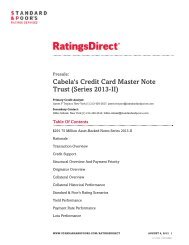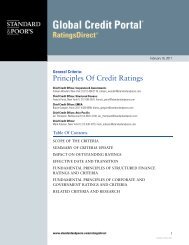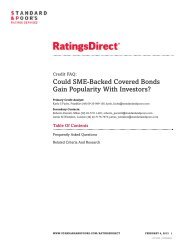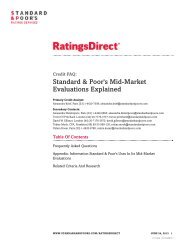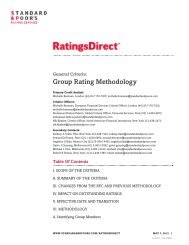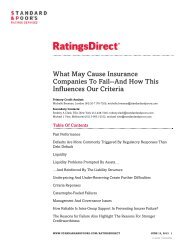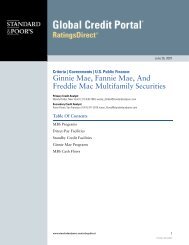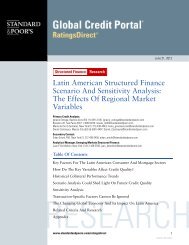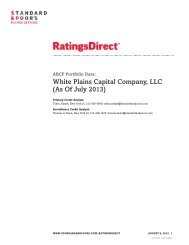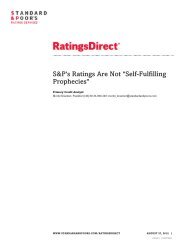Bank Ratings Incorporate Expectations For ... - Standard & Poor's
Bank Ratings Incorporate Expectations For ... - Standard & Poor's
Bank Ratings Incorporate Expectations For ... - Standard & Poor's
Create successful ePaper yourself
Turn your PDF publications into a flip-book with our unique Google optimized e-Paper software.
On Dec. 8, 2011, the EBA published a recommendation for European banks to increase their Core Tier 1 ratio to<br />
9% by June 2012, in addition to a buffer to cover mark-to-market losses on sovereign assets. The EBA estimated<br />
this so-called "sovereign buffer" to about €40 billion in December 2011, out of a total shortfall of €115 billion.<br />
This challenging target led many European banks to plan substantial capital raises and a reduction in RWA. On<br />
Feb. 9, 2012, the EBA published a preliminary review of the plans banks submitted to meet this target. The EBA<br />
estimates that the total actions banks planned will lead to a surplus that exceeds the regulators' requirements by<br />
approximately 26%. Direct capital raising (either through retained earnings, conversion of existing hybrids to Core<br />
Tier 1, equity issuance, or issuance of contingent convertible bonds) accounts for about three-quarters of the total<br />
actions, while reductions in RWA (deleveraging and internal model revisions) are responsible for the remainder. (See<br />
"As Europe's <strong>Bank</strong>s Look To Shore Up Capital, Pressure On Hybrid Debt Grows," published Feb. 13, 2012.) The<br />
EBA estimates that internal rating models revisions, which are neutral from a RAC perspective, will represent less<br />
than 10% of the total capital building measures. As a result of the total actions banks plan to take, we believe that<br />
their RAC ratios will strengthen and that the gap between European banks' ratios and non-EU banks' ratios will<br />
narrow.<br />
The EBA and BCBS studies ignore the transition period for Basel III that regulators scheduled to end in 2019, with<br />
some grandfathering of hybrids up to 2023. <strong>For</strong> more details on the Basel Committee study, see "Basel's Global<br />
Quantitative Impact Study Exposes Large <strong>Bank</strong>s’ Regulatory Capital Shortfall," published Dec. 20, 2010.<br />
Our Capital And Earnings Assessments Factor In Global <strong>Bank</strong>s' Expected<br />
Capitalization Improvements<br />
Generally, we expect that banks globally will continue to strengthen their capital ratios in anticipation of the Basel<br />
III capital requirements. We project these banks will continue to retain a significant amount of earnings, reduce<br />
RWA, raise capital, or a combination of the three, and our capital and earnings assessments reflect this. In fact,<br />
almost one-third of the banks that we have assigned adequate assessments have estimated RAC ratios as of Sept. 30,<br />
2011, of 5%-7% (see table 1). This range would correspond with a moderate assessment if the criteria did not factor<br />
in our projections.<br />
Table 1<br />
Distribution By Estimated RAC Ratio Ranges (%)<br />
<strong>Bank</strong> <strong>Ratings</strong> <strong>Incorporate</strong> <strong>Expectations</strong> <strong>For</strong> Improving Capital Assessments Globally<br />
Capital and earnings assessment Less than 5% 5%-7% 7%-10% 10%-15% More than 15%<br />
Weak 100 0 0 0 0<br />
Moderate 12 77 12 0 0<br />
Adequate 0 30 70 0 0<br />
Strong 0 0 36 55 9<br />
Very strong 0 0 0 0 100<br />
Note: Each line splits the banks with a given capital and earnings assessment by their estimated RAC ranges. Estimated RAC ratios as of Sept. 30, 2011.<br />
<strong>For</strong> example, some banks significantly raised capital since the end of September, which is not reflected in our RAC<br />
ratio estimates. Notably, in January 2012, Unicredit completed a €7.5 billion share capital increase, which raises our<br />
RAC ratio by about 105 basis points. We expect Unicredit's RAC ratio to approach 7% in the next 18-24 months,<br />
reflecting strong balance sheet control. In December 2011, National <strong>Bank</strong> of Greece completed the issuance of €1<br />
billion preference shares subscribed by the Greek government and realized about €300 million of capital gains from<br />
www.standardandpoors.com/ratingsdirect 7<br />
948538 | 300076937



